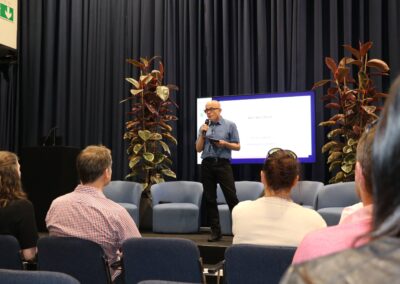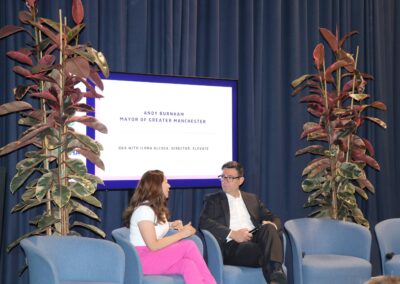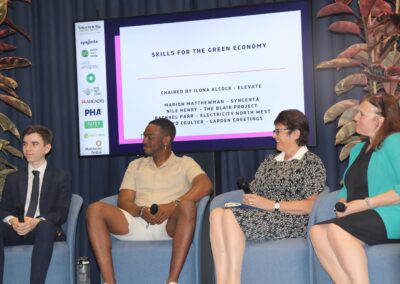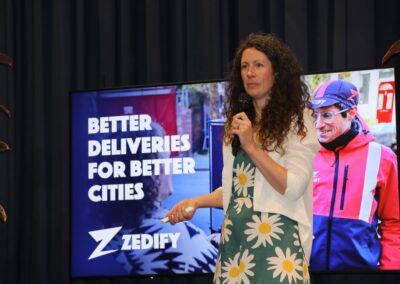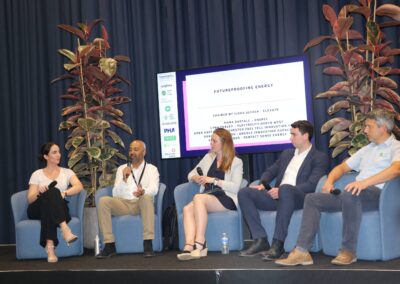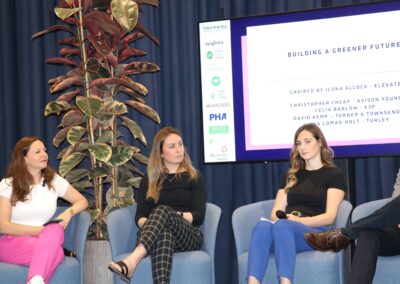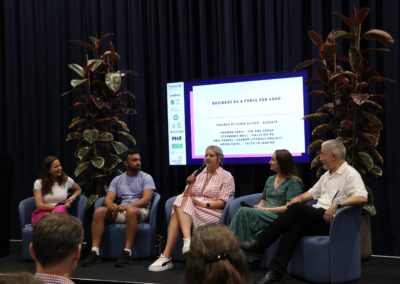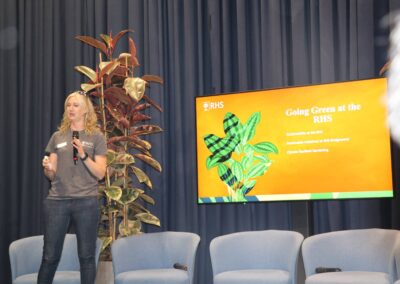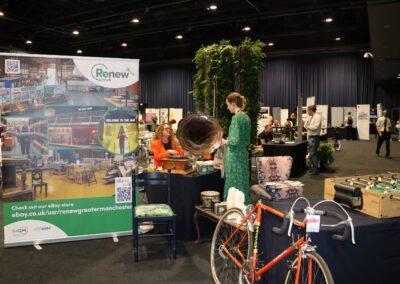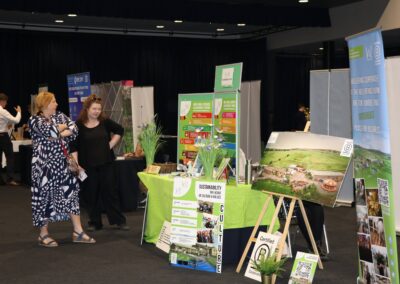On Monday 12 June 2023, the first-ever Northern Sustainability Summit was held at Manchester Central. The Summit, hosted by Elevate, brought together business leaders and change-makers from across the North to inspire, share and shape solutions to a greener future for businesses of all shapes, sizes and industries.
Several green tech, energy and sustainable businesses were exhibiting at the conference, allowing businesses to connect and liaise with them about green solutions that could help on their net zero journey.
Throughout the day speakers took to the stage to discuss a range of topics from how to make the hospitality and visitor economy industry more sustainable to advice on sustainable transport and energy.
In case you missed it, here is a summary of what happened throughout the day:
The first panel moderated by Ben Peace from Green Economy focused on The Growth Company Education and Skill’s Journey to Net Zero Programme, a fully funded programme available to learners across Greater Manchester to help them gain a critical understanding of net zero. Via group workshops, study material and one-to-one advice, environmental specialists guide learners through what net zero means for their business and how to prioritise action and build a strategic plan.
Joining the panel was Sanjay Sharma from the GC Education and Skill’s Journey to Net Zero programme, Rachael Ashah from Swiscot Group, Brett Mendell from Thomas Kneale and Angela Mansell from Mansell Building Solutions who had all recently completed the journey to net zero programme.
Angela Mansell said “One of the problems as an SME is knowing where to start. When we saw the opportunity to get involved in this it was a no-brainer. It’s set up to hold your hand as an SME and once you’ve completed it, you can take other people on the business on the journey with you.”
Brett Mendell said, “Ultimately, we have done a lot ourselves but as well as being doers, we’ve tried to be leaders and influence our supply chain. Ultimately this has given us a competitive advantage and has enabled us to grow our business.
Do not fear if you’ve not started, just get started, get support from The Growth Company and be open and honest. We need to work together.”
Then, GM Business Board (LEP) member and Mayor of Greater Manchester gave a keynote address to delegates outlining the region’s green ambitions and how businesses can play their part. The Mayor discussed the trailblazing devolution deal and the region’s ambitions for transport, skills and post-16 education to create a greener, fairer and more prosperous Greater Manchester.
Andy Burnham said, “Rather than this just being something we’ve got to do, we have to look at this as the biggest opportunity the North of England will get in our lifetime. The opportunity to reindustrialise the North with green energy, using the unique geography of the North of England and the devolution deal we’ve got to go first and become a leader in green energy and green technology.
“It’s an opportunity to give people greener, better places to live but also make our region fairer with lower energy costs. I feel this is a great moment for Greater Manchester I can feel a lot of eyes on us.”
Next leaders from the hospitality industry took to the stage to discuss how the industry can take steps to becoming more sustainable. Lucy Noone Blake was joined by Brett Parker from Gail’s Bakery, Matthew Gorecki founder of Indy Man Beer Con and Corin Bell founder of Open Kitchen. The panel discussed how hospitality businesses can be influencers in sustainability and have open conversations with customers about how to improve green credentials. The panel also discussed how to deal with food waste, supply chains and ethical sourcing as well as creating sustainable property across the industry.
Then, GM Business Board (LEP) Green Lead, Steve Connor gave businesses an introduction to the Bee Net Zero partnership, created to support businesses at all stages of the journey to net zero.
Steve Connor said “We wanted to make Greater Manchester the easiest place in the UK to get to net zero and we wanted to get to a place where all businesses in Greater Manchester can be seen as a green business.
“We’ve been through a series of phases such as focusing on green finance and building stock. Our next big move is to launch a big campaign around sunlight and its beauty.
“Greater Manchester has 1400 hours of sunshine every year, so we’re a perfectly viable solar city. Our plan is to launch a campaign whereas a business you can figure out the logistics, figure out the business case.”
Next, there was a panel on construction and property which discussed ESG requirements, the importance of carbon literacy training, retrofit, biodiversity net gain and the parallels between corporate real estate and residential real estate. Speakers included Christopher Cheap from Avison Young, Celia Barlow from E3P, David Kemp from Turner and Townsend and Fiona Lomas-Holt from Turley Planning.
In the final morning panel, ‘Business as a Force for Good’ Phil Korbel from Carbon Literacy, Hannah Craig from The PHA Group, Stephanie Wall from Palatine PE and Krish Patel from Tales to Inspire discussed how businesses can avoid greenwashing and become purpose-driven.
Krish Patel said “One of the most valuable things you’ll ever own as a company is your story. It’s one of the core things you can use to connect with people. Don’t be afraid to share your values.”
Hannah Craig said, “Keep it clear, simple and unambiguous. If you’re using a lot of jargon and people don’t understand you’re probably doing more harm than good. There’s a lot of confusion in the space as it is and if you’re using jargon that isn’t clear you’re adding to that rather than educating people on what you’re doing.”
Stephanie Wall said “For us, there is a real focus on the climate emergency. We knew we had to do something to upskill our people. Carbon Literacy helped us to put the climate emergency at the heart of everything we do.
It champions diversity of thought. You’ve got people in different roles making big decisions because we’ve been able to upskill and apply that climate lens.”
On the benefits of Carbon Literacy Phil Korbel said “Carbon literacy is a way to embed Carbon action as a core competence with your people. Why would you not optimise what your people can do to minimise the impact of the climate crisis? It’s about making it mainstream.”
After a short lunch break, we were back with a panel on Destination Makers and how to make the visitor economy more sustainable. Joining the panel was Jennifer Kelly from Chester Zoo, Feimatta Conteh from Factory International, Rachel Knight from The Science and Industry Museum and Shaun Hinds CEO of Manchester Central. They discussed the responsibility visitor attractions and cultural venues have to be educational when it comes to the climate crisis and the actions their specific venues are taking.
Feimatta Conteh said “About 70% of audiences now expect cultural venues to have a sustainability policy and to be doing something about it. Were used to walking into a venue and seeing reusable cups or paper straws but for me, it’s if that’s the standard how can Factory International go beyond that?”
Jennifer Kelly said “Sustainability has to touch everything we do. At Chester Zoo sustainability is part of our core reason for being. We cannot stop extinction without touching on issues that are broader than habitats, we’re bringing it right back to people’s lives. There’s a really strong argument for it not all being doom and gloom and peddling actions people can take.”
Rachel Knight said “About 70% of audiences now expect cultural venues to have a sustainability policy and to be doing something about it. Were used to walking into a venue and seeing reusable cups or paper straws but for me, it’s if that’s the standard how can we go beyond that?”
Shaun Hinds said “You come to events for inspiration and whatever sector it’s in, they’re always talking about the future. It’s all about the theme of innovation and as a venue we have to continue to raise the bar.”
Then it was time to turn to transport. The panel included Danny Parr from Arcadis, Pauline Johnston from Civic and Social, Azhar Quaiyoom from Q Sustain and Marc Palmer from Auto Trader. The panel discussed the transition to EVs, rail travel, decarbonising stations and rethinking their role as energy hubs as well as the importance of active travel and factoring it into future planning. The panel discussed the barriers to change and how changing perceptions is key to changing the future of travel.
The penultimate panel of the day focused on Green Skills. Marion Matthewmen of Syngenta, Nile Henry from The Blair Project, Rachel Parr from Electricity North West and student Lloyd Coulter, founder of Garden Greetings. The business leaders discussed green skills shortages and the challenges they’ve faced attracting young talent, how they’re now partnering with schools and upskilling existing teams. Nile Henry discussed the importance of practical hands-on skills and issues with the current curriculum. Lloyd Coulter pointed out a lack of awareness around green careers, with sustainability not featuring in the curriculum and employers not mentioning sustainability credentials.
The final panel of the day was all about Future Proofing Energy. Mara Rastall CEO of Enspec Power, Lynn Tracey Electricity North West, Amer Gaffar from Manchester Fuel Cell Innovation Centre, Daniell Dickinson from the Energy Innovation Agency and Gary Brandwood from Perfect Sense Energy joined the panel.
Mara Rastall said “The first issue businesses face is that issue of knowledge. When very few businesses understand what they need out of their electrical network, to begin with. Have a plan for the future and what you’d like your network to do for you.
“Finance is a barrier to installing renewables. If you don’t have a proper plan in place it can be more expensive to do nothing.”
Gary Brandwood said “Even if a business is a bit strapped for capital expenditure there are many finance routes to get these projects financed. We describe them as self-funding, it’s never been a better payback than now. In most cases, it’s an average of a 3-year payback. My top tip would be to do something. The worst thing you can do is nothing.”
Daniel Dickinson said “There’s a lot of pressure to have net zero plans now. Your net zero plan should be a part of your business plan as well because energy prices aren’t going to come down.”
Throughout the day there were also a series of lighting talks from various businesses and initiatives across Greater Manchester. Speakers included Autotrader, RHS Bridgewater, The National Trust, I Want Plants, the Renew Hub and Zedify UK, a cargo bike delivery service which will be launching in Manchester this month.
Thanks to Elevate, Manchester Central and headline sponsor Electricity North West for an inspiring and incredible day, bringing together businesses to encourage a greener future.
To learn more about how your Greater Manchester business can take steps on the journey to net zero, visit Bee Net Zero.

